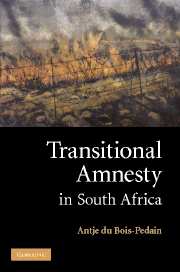Book contents
- Frontmatter
- Contents
- List of cited Amnesty Committee hearing transcripts
- Frequently cited Amnesty Committee decisions
- List of abbreviations
- List of abbreviated cases
- List of figures
- Preface
- Introduction
- 1 The TRC-based Amnesty Scheme: Background and Overview
- 2 The Practice of the Committee When Making Decisions
- 3 The Committee's Interpretation of the Political Offence Requirement
- 4 The Concept of Full Disclosure
- 5 Truth Recovery in the Amnesty Process
- 6 Victim Empowerment in the Amnesty Process
- 7 Perpetrator Accountability in the Amnesty Process
- 8 Conditional Amnesty and International Law
- 9 Conclusion
- Bibliography
- Index
- References
Bibliography
Published online by Cambridge University Press: 24 July 2009
- Frontmatter
- Contents
- List of cited Amnesty Committee hearing transcripts
- Frequently cited Amnesty Committee decisions
- List of abbreviations
- List of abbreviated cases
- List of figures
- Preface
- Introduction
- 1 The TRC-based Amnesty Scheme: Background and Overview
- 2 The Practice of the Committee When Making Decisions
- 3 The Committee's Interpretation of the Political Offence Requirement
- 4 The Concept of Full Disclosure
- 5 Truth Recovery in the Amnesty Process
- 6 Victim Empowerment in the Amnesty Process
- 7 Perpetrator Accountability in the Amnesty Process
- 8 Conditional Amnesty and International Law
- 9 Conclusion
- Bibliography
- Index
- References
- Type
- Chapter
- Information
- Transitional Amnesty in South Africa , pp. 349 - 371Publisher: Cambridge University PressPrint publication year: 2007



